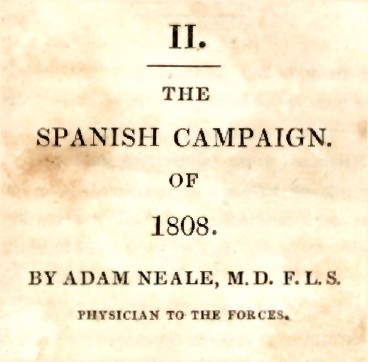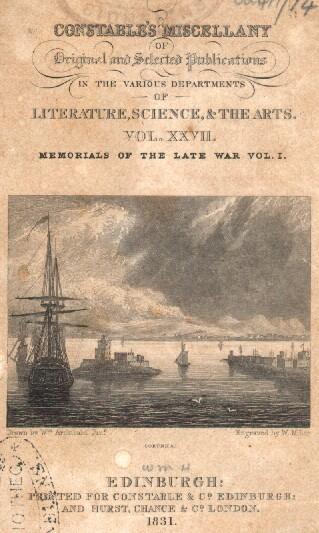

 Adam Neale was born in 1779, and joined the Edinburgh Fencibles when he was 16 (his first involvement with the military). Apart from his medical training and work, he had led a fairly adventurous life even before arriving in Spain, having travelled overland to Constantinople in company with a Colonel Rollo Gillespie in 1805-6. The latter was on his way to India, the land route being quicker than the sea trip, but even more risky.
Adam Neale was born in 1779, and joined the Edinburgh Fencibles when he was 16 (his first involvement with the military). Apart from his medical training and work, he had led a fairly adventurous life even before arriving in Spain, having travelled overland to Constantinople in company with a Colonel Rollo Gillespie in 1805-6. The latter was on his way to India, the land route being quicker than the sea trip, but even more risky.
He arrived in Spain in 1808 as Physician to Wellesley's original force and thus had seen the action at Vimeira even before marching into Spain with Moore. He published his "Letters from Spain and Portugal... " in 1809, making them one of the earliest published works on the Peninsular War. As well as writing letters, he sketched in his spare moments and his sketches of the campaign appear in a number of texts in my possession. After a time in charge of the military hospital in Deal, Kent (receiving the wreckage of the Walcheren expeditionary force) he returned to Spain taking charge successively of the hospitals at Abrantes, Coimbra and Ciudad Rodrigo. Neale died at Dunkirk in 1832.
While undoubtedly drawing heavily on his letters, the attached work appears to be an original work. It was probably written as a favour for his brother-in-law's publishing firm, which was facing bankruptcy and needed to generate income quickly. It is unlikely to be a coincidence that the first volume of the "Miscellany" series was the "Travels" of Captain Basil Hall. Captain Hall had been present at Corunna as a lieutenant on the Endymion, one of the evacuation ships.
There are a number of interesting points in this work. One is Neale's analysis of the state of Spain. While he obviously liked the Spaniards, he did not allow himself to be blind to their faults, in particular their disunity and disorganisation. The same can be said of his attitude to Sir John Moore. While he obviously liked and admired Moore, he felt that he became too negative and downcast by the problems of dealing with the Spaniards. His main criticism of Moore's conduct of the campaign is on the continued speed of the retreat, once the British had beaten the French to Astorga. This view is shared by a number of modern analysts. This said, we should remember that Neale was a physician, not a fighting soldier, and was rarely at the front line. But taking this into consideration, I would have thought that, for all his sympathy for Romana's ailing army, the Chief Surgeon of the British Army would also have felt concern for the possibility of the "contagion" spreading to his relatively healthy charges (as it in fact did).
Apart from the introductory remarks and Sir John Moore's Despatch, this text is unsectioned in the "Miscellany". In order to make it "web friendly" I have broken it up into shorter sections. In the interests of useability I have taken the liberty of attaching titles to the sections. I have attempted to correct all the typographic errors introduced during the scanning process, but have left original typographic errors and archaic spellings untouched except for the addition of the traditional "[sic]" to indicate that the "error" is in the original.
Thanks to Alan, a descendant of Adam Neale, for much of the personal information.
Introductory Remarks
The Advance to Salamanca
Politics at Salamanca
Plans and Advance
Start of the Retreat
Napoleon leaves it to Soult
The Stand at Corunna
Sir John Moore's Last Despatch
Return to Etexts
Return to Main Page
Content Copyright © 2000, 2001, 2002, 2003 Susan H Law and her licensors. All rights reserved.
Last update 7/2/03